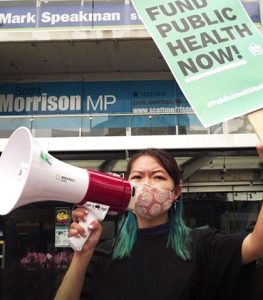Political participation and CALD communities – Scanlon report
The 2022 federal election has again highlighted the under-representation of people from culturally diverse communities in Australian politics.
While the make-up of the new parliament sees increased representation of culturally diverse Australians, and indeed also indigenous Australians, political participation remains elusive for the people from emerging communities.
 A timely new report from the Scanlon Institute looks at the reasons behind this.
A timely new report from the Scanlon Institute looks at the reasons behind this.
Researcher Trish Prentice says that while voting is compulsory for all eligible Australian citizens over 18, this type of political participation may not be as easily accessible for culturally diverse Australians.
She says many communities face barriers such as language, insufficient information or a lack of faith in a system that does not accurately reflect the people they represent.
The report, titled ‘From Petitions to Preselection’ also reveals alternative avenues to impacting policy-making, and asks if Australians from culturally diverse backgrounds engage politically at a greater level in these other spheres.
Speaking to local activists, reformers, educators and advocates, Ms Prentice analyses hurdles preventing participation within their respective communities and outlines what individuals have done to overcome them.
“Political participation stems from people’s right to take part in the conduct of public affairs and it is crucial for effective government,” she says.
“For democratic countries like Australia, whether and how people participate politically has an impact on the country’s political health.
“For a long time we have known that our elected representatives do not reflect the full diversity of the Australian population,” Ms Prentice said.
The report says political participation can take a variety of different forms, and Australians from culturally diverse backgrounds are participating politically in a variety of different ways.
But there are barriers to political participation for cultural communities in Australia.
“They consist of inadequate knowledge of the Australian political system or of the forums available for participation,” Ms Prentice said.
“Language barriers can play a role, as can information presented in a way that is inaccessible or difficult to digest for non-native English speakers. Experiences in home countries present further complexities to political participation in Australia,” she said.
“They can be facilitating factors, providing enthusiasm for engaging in a political system that is more easily accessible or that poses less risk than what they had experienced previously, or they can present real obstacles to full engagement.
“Cultural understandings of who should have access to political spheres or what political participation should look are real challenges that some Australians have to navigate.
“However, for those who have overcome those barriers, who have adequate knowledge of how the Australian political system works or who, perhaps, have been lucky enough to have had others walk with them (or before them) on their political journey, participation has provided a way to channel frustration and to address issues that are important to them or to their community.
“These individuals have found value in deeper engagement and have been able to take tangible steps toward bringing about change for themselves and for others,” Ms Prentice said.
A 2018 report by the Australian Human Rights Commission noted only approximately four percent of Australian MPs come from a non-European background and only about one percent have an Indigenous background.
The latest election saw the number of CALD MPs in the federal parliament rise to six per cent, this still falls short of the 21 per cent of Australia’s voting population who are from non-European backgrounds.
While efforts have been made to increase diversity in Australia’s political landscape, most elected representatives are still “white, male and, on average, over 50”, Ms Prentice said.
“These statistics stand in stark contrast to Australia’s diverse and multicultural population. The 2016 census found that almost half of Australians were born overseas or had at least one parent who was,” she said.
“Australians come from nearly every country around the world. Clearly, this diversity is not reflected in our political machinery, at least in terms of direct representation.
“However, being elected to office is only one measure of political participation and not everyone engages in politics in order to become a politician,” Ms Prentice said.
Read the full report here: From Petitions to Preselection | Scanlon institute












